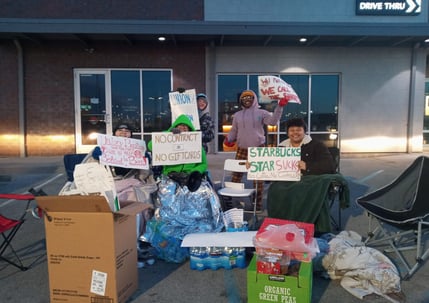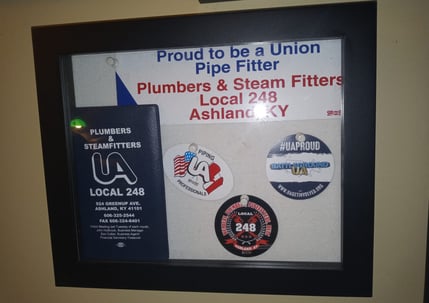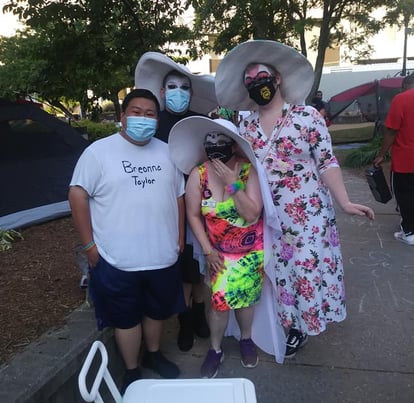Solidarity Across the Entire Working Class
Benjamin A. Berry
9/11/2024
It was extremely cold on December 17, 2022 around six o’clock in the morning. I had stopped by the union Starbucks in Clarksville, Indiana to show solidarity with the workers who had gone on strike that morning before I had to go into work myself. Arriving outside the coffee shop, one might have easily mistaken the group of huddled and bundled workers for a giant pile of laundry. Despite the blankets, toboggans, mittens, and jackets, the workers were understandably freezing and, within a few minutes, I was, too!


Around six-thirty, we saw a beat-up truck slowly pull into the parking lot, headed straight for us. Up to that point, there was very little traffic with only one or two would-be customers arriving to find out the store was shut down due to the work stoppage. This truck seemed to drive extra cautiously—slowly and deliberately—and in the morning’s darkness I could only see the silhouette of a man with a trucker hat. Being on a picket line with young, mostly Queer workers, my guard immediately came up at this turn of events. Images of some gun-toting, Queer-bashing, anti-union fascist put me on edge as I prepared for a confrontation.
“Y’all the ones on strike?” the man asked—an elderly white man in jean overalls, pretty close to what I had imagined based on his truck.
The workers answered in the affirmative.
The man suddenly reached to his passenger seat, beyond my line of sight. I tensed.
“I heard about y’all.” he said, the item in his hands now in view. “I’m an old Teamster myself and wanted to bring y’all some donuts and to wish you all the best!”
The good union man and the organized Starbucks workers spoke for a little bit, the tension entirely banished with his introduction. After a few minutes, they exchanged farewells and words of solidarity, leaving me with a profound sense of gratitude for having witnessed the interaction. Over the years I’ve stood on countless picket lines and attended numerous solidarity actions and demonstrations, but this experience will always stand as one of the most impactful and powerful in my memory. Beholding such a moving display of solidarity greatly affected me.
It's no secret that huge swaths of the working class are divided from one another in modern American society. Racism, queerphobia, sexism, nativism, and other social chauvinisms have prevented a strong unification of all aspects of our class. The old “skilled” versus “unskilled” argument has remanifested itself into ignorant phrases like “Why do coffee baristas (or fast food workers or college students or fill-in-the-blank) need a union? Unions are for real workers!”
As with any obstacle or problem facing working and oppressed people, the way forward to liberation must include unbreakable ties of solidarity across the entire working class. This must be built—not just between members within a single union, nor just between union members across all of organized labor—but across our entire class, incorporating the organized as well as the unorganized, the student worker, the incarcerated worker, the unemployed worker, and every demographic that constitutes our diverse class. Singling out other sections of our class for demonization—be they students, the homeless, or some specific demographic of folks—only serves the interests of the ruling owning class, crippling power we should be cultivating to build a world for working people.
For this reason, the Brigade includes students, the unemployed, the homeless, and the incarcerated within the ranks of the working class and eagerly organizes with them. We recognize the fact that the homeless and unemployed, for instance, are used by the owning class as a weapon of fear against workers currently employed: “If you don’t do exactly as we say, we’ll replace you with someone who will! There’s plenty of people looking for work that would happily take your job!” It is for this reason that, under our present economic ordering, there must exist a large pool of unemployed folks—their condition is manufactured and weaponized by our exploiters and oppressors. Additionally, prisoners easily fall into the class of working people, as anyone who is familiar with the horrifically exploitative system of inmate labor can tell you.
I’ve worked in the automotive industry for the past eight years in various positions. Early on, I worked as a car salesman (yes, it was as slimy and as horrible as you’re probably thinking) before I finally had enough and moved to a different department. One bright spot of my time in sales, however, is worth sharing:
I had an out-of-town customer interested in purchasing a truck. He was from right outside of Ashland, KY and so we worked at all of the details of his purchase prior to him (and his son) making the trip down to Louisville to finalize everything. I don’t recall exactly how we made the connection, but we quickly discovered, once he arrived to purchase his new truck, that he and his son were both organized with The United Association of Journeymen and Apprentices of the Plumbing and Pipefitting Industry of the United States and Canada (UA) Local 248 and that I was an avid supporter of organized labor. This quickly opened up a long conversation about what the union had done for their family, my experiences in providing solidarity support to workers, the legacy of unionism in Appalachia, and the state of the modern labor movement. At the time, the coal miners down at Warrior Met in Alabama were in the middle of what would become a failed two year strike, so we spoke about the utter lack of media coverage on that work stoppage, the violence from the bosses against the workers (there were numerous instances of management running over strikers with their vehicles), and the strikebreakers that the company had brought in during the stoppage (my customer’s son rightly labeled such class traitors as “scabs”). A couple of weeks after my customer left in his new truck, I was surprised and honored to receive a gift package from my new friend: a whole collection of UA stickers and other memorabilia that he’d set aside for me!


Liberals and privileged suburbanites would have condescendingly judged my Appalachian friend simply due to his accent, his line of work, and his residence in Eastern Kentucky. I know this because there was a time in my life when I also would have judged him in a similar way. (For a more detailed analysis of my past prejudices, please refer to my article, “Solidarity with the Rednecks!” which was published back in May here in The Class Struggle Chronicle.) Unfortunately, another division that exists within our class is that between those living in larger metropolitan areas like Louisville and those who live in “the sticks” like my friend in Appalachia. Us “city folks” are constantly told that the hillbillies in the country are a bunch of racist, backwards, inbred hicks who want all Queer and Black folks lynched (this is hyperbolic, of course, but that’s not to say that the propaganda against Appalachian folk isn’t horrendous here in the city). Conversely, the people of Appalachia are fed equally absurd lies that those uppity city-dwellers are a bunch of commies who want to raise taxes to ninety-nine percent, force their children to get gender reassignment surgeries, and turn all of coal country into an avocado farm for Gen Z’s brunch toast.
This isn’t to say, of course, that racism doesn’t exist or that there aren’t deranged city people who would call for the further destruction of Appalachia without any concern for the workers’ welfare there. Again, these sentiments do exist within the working class, causing terrible division, but we must recognize which class is stoking the flames of bigotry and whose interests this division serves. What working people must understand is that, as fellow workers, we have far more in common with each other than we do with anyone within the owning class. While these social chauvinisms may predate our current ruling class, they have been enflamed and weaponized by them to keep unified worker power from becoming a revolutionary reality.
I realize that this article is mostly a collection of personal anecdotes centered around the common theme of solidarity. In my years of organizing, I’ve been very fortunate to have seen what real community-building looks like. From watching the Queer community rally around the call to end racist policing in the 2020 Black Lives Matter protests to encountering numerous UAW, Teamster, and IBEW workers walk picket lines in solidarity at other union workers’ strikes, just my limited stories could fill an entire book. One of the things I am most proud of is the number of non-union folks I’ve had the privilege of taking to their first picket line, introducing them to the experience of a strike and seeing their reaction to the power of organized labor; such experiences, I’ve found, do so much for building class consciousness in unorganized working people. Many of these “first-timers,” I’m happy to report, have gone on to organize their workplaces after seeing what a union can do for workers.


Building these bridges—between the organized and unorganized, between Blacks and whites, between the rural and urban, between men and women, between Queer and cis-het, between native and immigrant, between the employed and unemployed—this is the paramount task of organizers today. In building solidarity between these normally-disparate demographics, we are creating an unstoppable force of working and oppressed people that will have the power to reshape this world for the better. Only together can we overcome the might and resources of our exploiters and oppressors. United, well… I think the old labor song, “Solidarity Forever,” says it best:
In our hands is placed a power greater than their hoarded gold,
Greater than the might of atoms, magnified a thousand-fold.
We can bring to birth a new world from the ashes of the old
For the union makes us strong!
